
MG-1018
ECN4547-MA
ECM OPERATION MANUAL
FOR USE WITH MODELS:
CHX1-75N CDX1-75N
CHX1-100N CDX1-100N
CHX1-125N CDX1-125N
: IF YOU DO NOT FOLLOW THE SAFETY PRECAUTIONS BELOW AND IN THIS MANUAL, A
FIRE OR EXPLOSION MAY RESULT CAUSING PROPERTY DAMAGE, PERSONAL INJURY, OR LOSS OF
LIFE.
DO NOT STORE OR USE GASOLINE OR OTHER FLAMMABLE VAPORS AND LIQUIDS IN THE VICINITY OF
THIS OR ANY OTHER APPLIANCE.
WHAT TO DO IF YOU SMELL GAS:
• DO NOT TRY TO LIGHT ANY APPLIANCE.
• DO NOT TOUCH ANY ELECTRICAL SWITCH; DO NOT USE ANY PHONE IN YOUR BUILDING.
• LEAVE THE BUILDING IMMEDIATELY.
• IMMEDIATELY CALL YOUR GAS SUPPLIER FROM A NEIGHBOR’S PHONE. FOLLOW THE GAS
SUPPLIER’S INSTRUCTIONS.
• IF YOU CANNOT REACH YOUR GAS SUPPLIER; CALL THE FIRE DEPARTMENT.
INSTALLATION AND SERVICE MUST BE PERFORMED BY A QUALIFIED INSTALLER, SERVICE AGENCY OR
THE GAS SUPPLIER. (REFERRED TO IN THESE INSTRUCTIONS AS A QUALIFIED HEATING
CONTRACTOR).
PLEASE READ THESE INSTRUCTIONS PRIOR TO INSTALLATION, INITIAL FIRING, AND BEFORE
PERFORMING ANY SERVICE OR MAINTENANCE. THESE INSTRUCTIONS MUST BE LEFT WITH THE
HOMEOWNER AND SHOULD BE RETAINED FOR FUTURE REFERENCE BY QUALIFIED SERVICE
PERSONNEL.
THERMO PRODUCTS, LLC.
BOX 217
NORTH JUDSON, IN 46366
PHONE: (574) 896-2133
MADE IN USA

All installations and services must be performed by qualified service personnel.
i
INDEX
SECTION
BEGINNING PAGE
I. FURNACE SPECIFICTIONS (SHIPPED SETTINGS) 1
II. BLOWER INFORMATION 3
A. WIRING 3
B. CFM TABLES 4
III. ECM TROUBLESHOOTING 6
A. GENERAL GUIDELINES TO TROUBLESHOOTING GE ECM 6
B. TROUBLESHOOTING CHARTS 9

All installations and services must be performed by qualified service personnel.
1
I. FURNACE SPECIFICATIONS (SHIPPED SETTINGS)
CHX1 SERIES
MODEL NO. CHX1-75 CHX1-100 CHX1-125
HEAT INPUT RATE IN BTU/HR
(High fire/ Low fire)
75,000 / 52,000 100,000 / 70,000 125,000 / 87,500
HEATING CAPACITY IN BTU/HR
(High fire/ Low fire)
70,875 / 49,612 94,500 / 66,150 117,500 / 82,250
HEIGHT OF CASING
44-1/4” 44-1/4” 44-1/4”
WIDTH OF CASING
17” 21” 24”
DEPTH OF CASING
27-1/2” 27-1/2” 27-1/2”
WARM AIR OUTLET
15 x 18 19 x 18 22 x 18
RETURN AIR INLET
25 x 16 25 x 16 25 x 16
DIA. OF FLUE
2” 3” 3”
DIA. OF COMBUSTION
AIR INTAKE
2” 3” 3”
FLOWRATE from .2” & .5” w.c.
EXTERNAL STATIC PRESSURE
COOLING COOLING COOLING
@COOLING TAP A (CFM)
1000 1200 1400
@COOLING TAP B (CFM)
800 1000 1200
@COOLING TAP C (CFM)
1200 1400 1600
@COOLING TAP D (CFM)
1400 1600 2000
HEATING HEATING HEATING
@HEATING TAP A
(CFM @High fire/Low fire)
931 / 760 1243 / 1015 1556 / 1270
TEMPERATURE RISE (°F)
70 / 60 70 / 60 70 / 60
BLOWER MOTOR HP
.5 .75 1
POWER CHOKES
- 2.65 Mh 2.1 Mh
LARGEST RECOMMENDED
AIR CONDITIONER
3.5 Ton 4 Ton 5 Ton
SIZE OF FILTERS
24-3/4” x 15-3/4” 24-3/4” x 15-3/4” 24-3/4” x 19-3/4”
NOTES:
1. Heating capacity based on annual fuel utilization efficiency rated by manufacturer.
2. On all outlet and inlet dimensions, the first dimension is width.
3. To permit largest recommended air conditioning (at .5 static pressure), selection of the highest motor speed is
required.
4. Electrical characteristics at 115 volts, 60 Hz., 1 phase (less than 15 amps, for all models).
5. All specifications are subject to change without notice.

All installations and services must be performed by qualified service personnel.
2
CDX1 SERIES
MODEL NO. CDX1-75 CDX1-100 CDX1-125
HEATING INPUT RATE IN BTU/HR
(High fire / Low fire)
75,000 / 56,250 100,000 / 75,000 125,000 / 93,750
HEATING CAPACITY IN BTU/HR
(High fire / Low fire)
69,750 / 52,312 93,000 / 69,750 116,250 / 87,187
HEIGHT OF CASING
46-1/4” 46-1/4” 46-1/4”
WIDTH OF CASING
17” 21” 24”
DEPTH OF CASING
27-1/2” 27-1/2” 27-1/2”
WARM AIR OUTLET
15 x 18 19 x 18 22 x 18
RETURN AIR INLET
15 x 22 19 x 22 22 x 22
DIA. OF FLUE
2” 3” 3”
DIA. OF COMBUSTION
AIR INTAKE
2” 3” 3”
FLOWRATE from .2” & .5” w.c.
EXTERNAL STATIC PRESSURE
COOLING COOLING COOLING
@COOLING TAP A (CFM)
1000 1200 1400
@COOLING TAP B (CFM)
800 1000 1200
@COOLING TAP C (CFM)
1200 1400 1600
@COOLING TAP D (CFM)
1400 1600 2000
HEATING HEATING HEATING
@HEATING TAP C
(CFM @ High fire / Low fire)
1012 / 826 1340 / 1094 1673 / 1366
TEMPERATURE RISE (°F)
65 / 60 65 / 60 65 / 60
BLOWER MOTOR HP
.5 .75 1
POWER CHOKES
- 2.65Mh 2.1Mh
LARGEST RECOMMENDED
AIR CONDITIONER
3.5 Ton 4 Ton 5 Ton
SIZE OF FILTERS
21-3/4” x 14”(2) 21-3/4” x 14”(2) 21-3/4” x 14”(2)
NOTES:
1. Heating capacity based on annual fuel utilization efficiency rated by manufacturer.
2. On all outlet and inlet dimensions, the first dimension is width.
3. To permit largest recommended air conditioning (at .5 static pressure), selection of the highest motor speed is
required.
4. Electrical characteristics at 115 volts, 60 Hz., 1 phase (less than 15 amps. for all models).
5. All specifications are subject to change without notice.

All installations and services must be performed by qualified service personnel.
3
II. BLOWER INFORMATION
A. WIRING
Figure 1: BLOWER WIRING
: TURN OFF THE ELECTRICAL POWER to the furnace before attempting to disconnect blower
wiring.

All installations and services must be performed by qualified service personnel.
4
B. CFM TABLES
The following tables contain blower speed settings and their respective air flowrates for the ECM blower motor. To
change air flowrates from that of the shipped settings, use the respective S3 and S4 dipswitches on the furnace’s
integrated control board (see Figure 1).
Dip
switch
settings Low fire CFM Rise (
o
F)
High Fire
CFM Rise (
o
F)
Dip
switch
settings Low fire CFM Rise (
o
F)
High Fire
CFM Rise (
o
F)
7-OFF
8-OFF 760 64 931 70
7-OFF
8-OFF 760 60 931 70
7-ON
8-OFF 708 69 867 75
7-ON
8-OFF 708 65 867 75
7-OFF
8-ON 826 59 1012 65
7-OFF
8-ON 826 55 1012 65
7-ON
8-ON 909 54 1114 59
7-ON
8-ON 909 50 1114 59
Dip
switch
settings Low fire CFM Rise (
o
F)
High Fire
CFM Rise (
o
F)
Dip
switch
settings Low fire CFM Rise (
o
F)
High Fire
CFM Rise (
o
F)
7-OFF
8-OFF 1015 64 1243 70
7-OFF
8-OFF 1015 60 1243 70
7-ON
8-OFF 947 69 1160 75
7-ON
8-OFF 947 64 1160 75
7-OFF
8-ON 1094 60 1340 65
7-OFF
8-ON 1094 56 1340 65
7-ON
8-ON 1184 55 1450 60
7-ON
8-ON 1184 51 1450 60
Dip
switch
settings Low fire CFM Rise (
o
F)
High Fire
CFM Rise (
o
F)
Dip
switch
settings Low fire CFM Rise (
o
F)
High Fire
CFM Rise (
o
F)
7-OFF
8-OFF 1270 64 1556 70
7-OFF
8-OFF 1270 60 1556 70
7-ON
8-OFF 1185 69 1452 75
7-ON
8-OFF 1185 64 1452 75
7-OFF
8-ON 1366 60 1673 65
7-OFF
8-ON 1366 56 1673 65
7-ON
8-ON 1480 55 1813 60
7-ON
8-ON 1480 51 1813 60
=FACTORY SHIPPED SETTINGS
CDX1-125 CHX1-125
HEATING SPEEDS
CDX1-75 CHX1-75
CDX1-100 CHX1-100

All installations and services must be performed by qualified service personnel.
5
Dip
switch
setting
Continuous
fan
CFM Cooling CFM
Dip
switch
setting
Continuous
fan
CFM Cooling CFM
Dip
switch
setting
Continuous
fan
CFM Cooling CFM
1-OFF
2-OFF
3-ON
4-OFF 500 1150
1-OFF
2-OFF
3-ON
4-OFF 600 1380
1-OFF
2-OFF
3-ON
4-OFF 700 1610
1-OFF
2-OFF
3-OFF
4-OFF 500 1000
1-OFF
2-OFF
3-OFF
4-OFF 600 1200
1-OFF
2-OFF
3-OFF
4-OFF 700 1400
1-OFF
2-OFF
3-OFF
4-ON 500 850
1-OFF
2-OFF
3-OFF
4-ON 600 1020
1-OFF
2-OFF
3-OFF
4-ON 700 1190
1-ON
2-OFF
3-ON
4-OFF 400 920
1-ON
2-OFF
3-ON
4-OFF 500 1150
1-ON
2-OFF
3-ON
4-OFF 600 1380
1-ON
2-OFF
3-OFF
4-OFF 400 800
1-ON
2-OFF
3-OFF
4-OFF 500 1000
1-ON
2-OFF
3-OFF
4-OFF 600 1200
1-ON
2-OFF
3-OFF
4-ON 400 680
1-ON
2-OFF
3-OFF
4-ON 500 850
1-ON
2-OFF
3-OFF
4-ON 600 1020
1-OFF
2-ON
3-ON
4-OFF 600 1380
1-OFF
2-ON
3-ON
4-OFF 700 1610
1-OFF
2-ON
3-ON
4-OFF 800 1840
1-OFF
2-ON
3-OFF
4-OFF 600 1200
1-OFF
2-ON
3-OFF
4-OFF 700 1400
1-OFF
2-ON
3-OFF
4-OFF 800 1600
1-OFF
2-ON
3-OFF
4-ON 600 1020
1-OFF
2-ON
3-OFF
4-ON 700 1190
1-OFF
2-ON
3-OFF
4-ON 800 1360
1-ON
2-ON
3-ON
4-OFF 700 1600
1-ON
2-ON
3-ON
4-OFF 800 1700
1-ON
2-ON
3-ON
4-OFF
1000
2300
1-ON
2-ON
3-OFF
4-OFF 700 1400
1-ON
2-ON
3-OFF
4-OFF 800 1600
1-ON
2-ON
3-OFF
4-OFF
1000
2000
1-ON
2-ON
3-OFF
4-ON 700 1190
1-ON
2-ON
3-OFF
4-ON 800 1360
1-ON
2-ON
3-OFF
4-ON
1000
1700
COOLING AND CONTINUOUS FAN SPEEDS
CDX1-125 & CHX1-125
=FACTORY SHIPPED SETTINGS
CDX1-75 & CHX1-75 CDX1-100 & CHX1-100

All installations and services must be performed by qualified service personnel.
6
III. ECM TROUBLE SHOOTING
A. GENERAL GUIDELINES TO TROUBLESHOOTING GE ECM – DRIVEN SYSTEMS
:
Disconnect power from unit before removing or replacing connectors, or servicing motor.
Wait at least 5 minutes after disconnecting power before opening motor.
SYMPTOM CAUSE/PROCEDURE
Motor rocks slightly when starting
• This is normal start-up for ECM
Motor won’t start
• No movement
• Check power at motor
• Check low voltage (24 VAC R to C) at motor
• Check low voltage connections (G,Y,W,R,C,) at
motor
• Check for unseated pins in connectors on motor
harness
• Test with a temporary jumper between R – G
• Check motor for tight shaft
• Perform motor/control replacement check
• Run Moisture Check
• Motor rocks, but won’t start • Check for loose or compliant motor mount
• Make sure blower wheel is tight on shaft
• Perform motor/control replacement check
Motor oscillates up & down while being tested off
of blower
• It is normal for motor to oscillate with no load on
shaft.
Motor starts, but runs erratically
• Varies up and down or intermittent
• Check line voltage for variation or “sag”
• Check low voltage connections (G,Y,W,R,C,) at
motor, unseated pins in motor harness connectors
• Check “Bk” for erratic CFM command (in
variable speed applications)
• Check-out system controls – T’stat?
• Perform Moisture Check
• “Hunts” or “puffs” at high CFM (speed) • Does removing panel or filter reduce “puffing”?
! Reduce restriction
! Reduce max airflow
• Stays at low CFM despite system call for cool or
heat CFM
• Check low voltage (T’stat) wires and connections
• Verify fan is not in delay mode – wait until delay
complete
• “R” missing/not connected at motor
• Perform motor/control replacement check
• Stays at high CFM • “R” missing/not connected at motor
• Is fan in delay mode? – wait until delay time
complete
• Perform motor/control replacement check
• Blower won’t shut off • Current leakage from controls into G,Y or W?
Check for Triac switched t’stat or solid state relay
Excessive noise
• Determine if it’s air noise, cabinet, duct or motor
noise – interview customer, if necessary
• Noisy blower or cabinet • Check for loose blower housing, panels, etc.
• High static creating high blower speed?
! Check for air whistling thru seams in ducts,
cabinets or panels
! Check for cabinet/duct deformation

All installations and services must be performed by qualified service personnel.
7
• “Hunts” or “puffs” at high CFM (speed) • Does removing panel or filter reduce “puffing”?
! Reduce restriction
! Reduce max airflow
Evidence of Moisture
• Motor failure or malfunction has occurred and
moisture is present
• Replace motor and perform Moisture Check
• Evidence of moisture present inside air mover • Perform Moisture Check
DO
DON’T
• Check-out motor, controls, wiring and
connections thoroughly before replacing motor
• Automatically assume the motor is bad.
• Orient connectors down so water can’t get in
! Install “drip loops”
• Locate connectors above 7 and 4 o’clock
positions
• Use authorized motor and control model #’s for
replacement
• Replace one motor or control model # with
another (unless an authorized replacement)
• Keep static pressure to a minimum:
! Recommend high efficiency, low static
filters
! Recommend keeping filters clean
! Design ductwork for min static, max
comfort
! Look for and recommend ductwork
improvement, where necessary, in
replacement
• Use high pressure drop filters – some have ½”
H
2
O drop!
• Use restricted returns
• Size the equipment wisely • Oversize system then compensate with low
airflow
• Check orientation before inserting motor
connectors
• Plug in power connector backwards
• Force plugs
Moisture Check
• Connectors are orientated “down” (or as recommended by equipment manufacturer)
• Arrange harnesses with “drip loop” under motor
• Is condensate drain plugged?
• Check for low airflow (too much latent capacity)
• Check for undercharged condition
• Check and plug leaks in return ducts, cabinet
Comfort Check
• Check proper airflow settings
• Low static pressure for lowest noise
• Set low continuous-fan CFM
• T’stat in bad location?

All installations and services must be performed by qualified service personnel.
8
Figure 2: ECM PIN CONNECTORS
Troubleshooting table above and Figure 2 adapted from GE Industrial Systems publication GED-7161C,
“Troubleshooting GE ECM – Driven Systems”.

All installations and services must be performed by qualified service personnel.
9
B. TROUBLESHOOTING CHARTS
CONFIRM IF EITHER BLOWER
WHEEL IS RUBBING AGAINST
HOUSING OR MOTOR SHAFT
IS SPINNING FREELY, REPAIR
OR REPLACE AS NECESSARY.
DOES BLOWER SPIN FREELY?
IS THERE 115V
SUPPLIED TO MOTOR?
CHECK 115V SUPPLY,
CONNECTION FUSES,
SERVICE SWITCH AND
DOOR SWITCH.
CHECK HARNESS
CONNECTIONS
AND WIRE.
NO
YES
YES
YES
YES
NO
NO
NO
NO
NO
YES
YES
DISCONNECT 16 PIN
HARNESS FROM
MOTOR. IS THERE 24V
ACROSS PIN12 & PIN1
AND PIN12 & PIN3
AT THE HARNESS PLUG?
CHECK CONNECTION ON HARNESS AND MOTOR,
RECONNECT HARNESS TO MOTOR, IF
CONNECTIONS ARE GOOD AND MOTOR STILL
DOES NOT RUN REPLACE MOTOR.
THIS GUIDE SHOULD BE USED IN THE CASE OF A STOPPED OR MANFUNCTIONED ECM
BLOWER MOTOR. THE FOLLOWING SHOULD HELP ESTABLISH THE TYPE OF
MALFUNCTION OR DEVIATION FROM THE NORMAL BLOWER OPERATION.
TO USE THIS DIAGRAM, YOU JUST NEED TO FOLLOW THE INSTRUCTIONS IN THE BOXES.
CHECK 24V SUPPLY
TO INTEGRATED CONTROL.
IS THERE 24V
ACROSS R &
B/C ON THE
INTEGRATED
CONTROL?
REPLACE
INTEGRATED
CONTROL.
TURN THERMOSTAT MANUAL FAN
SWITCH ON (IF AVAILABLE) OR JUMPER
BETWEEN R & G ON INTEGRATED CONTROL.
IS THERE VOLTAGE GREATER THAN
12V BETWEEN PIN15 & PIN1?
CHECK CONNECTIONS AND WIRES
AT INTEGRATED CONTROL, IF OK
REPLACE INTEGRATED CONTROL.
DISCONNECT 16PIN
HARNESS FROM
INTEGRATED CONTROL.
IS THERE 24V ACROSS
PIN12 & PIN1 AND
PIN12 & PIN3
AT THE CONROL?
-
 1
1
-
 2
2
-
 3
3
-
 4
4
-
 5
5
-
 6
6
-
 7
7
-
 8
8
-
 9
9
-
 10
10
-
 11
11
Thermo Pride MG-1018 User manual
- Type
- User manual
- This manual is also suitable for
Ask a question and I''ll find the answer in the document
Finding information in a document is now easier with AI
Related papers
-
Thermo Pride Thermo CHX1-125N User manual
-
Thermo Pride AOPS7466 Owner's manual
-
Thermo Pride OL16-125FDBE Owner's manual
-
Thermo Pride OL16-125 Owner's manual
-
Thermo Pride CHX3 Owner's manual
-
Thermo CBD1-100N User manual
-
Thermo Pride AH4 Owner's manual
-
Thermo Pride Thermo Pride Air Conditioner 36)- 80 User manual
Other documents
-
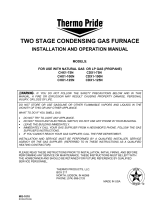 Thermo Products Thermo CHX1-125N User manual
Thermo Products Thermo CHX1-125N User manual
-
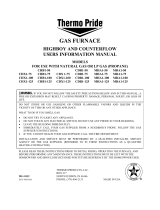 Thermo Products CDB1-125 User manual
Thermo Products CDB1-125 User manual
-
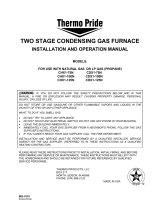 Thermo Products Thermo CHX1-125N User manual
Thermo Products Thermo CHX1-125N User manual
-
White Rodgers 21V51U-843 Reference guide
-
Crown Boiler Oil Furnace Shorty Ecm Motor User manual
-
Trane AUH2C100A9V5VA Service Facts
-
Bard FH085V42A Operating instructions
-
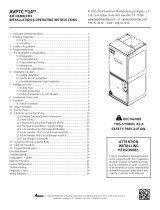 GOODMAN AVPTC39C14 Installation guide
GOODMAN AVPTC39C14 Installation guide
-
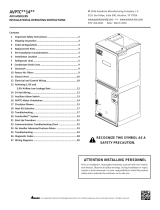 GOODMAN AVPTC29B14 Installation guide
GOODMAN AVPTC29B14 Installation guide
-
Rheem RH2V3621MTANJA Installation guide















